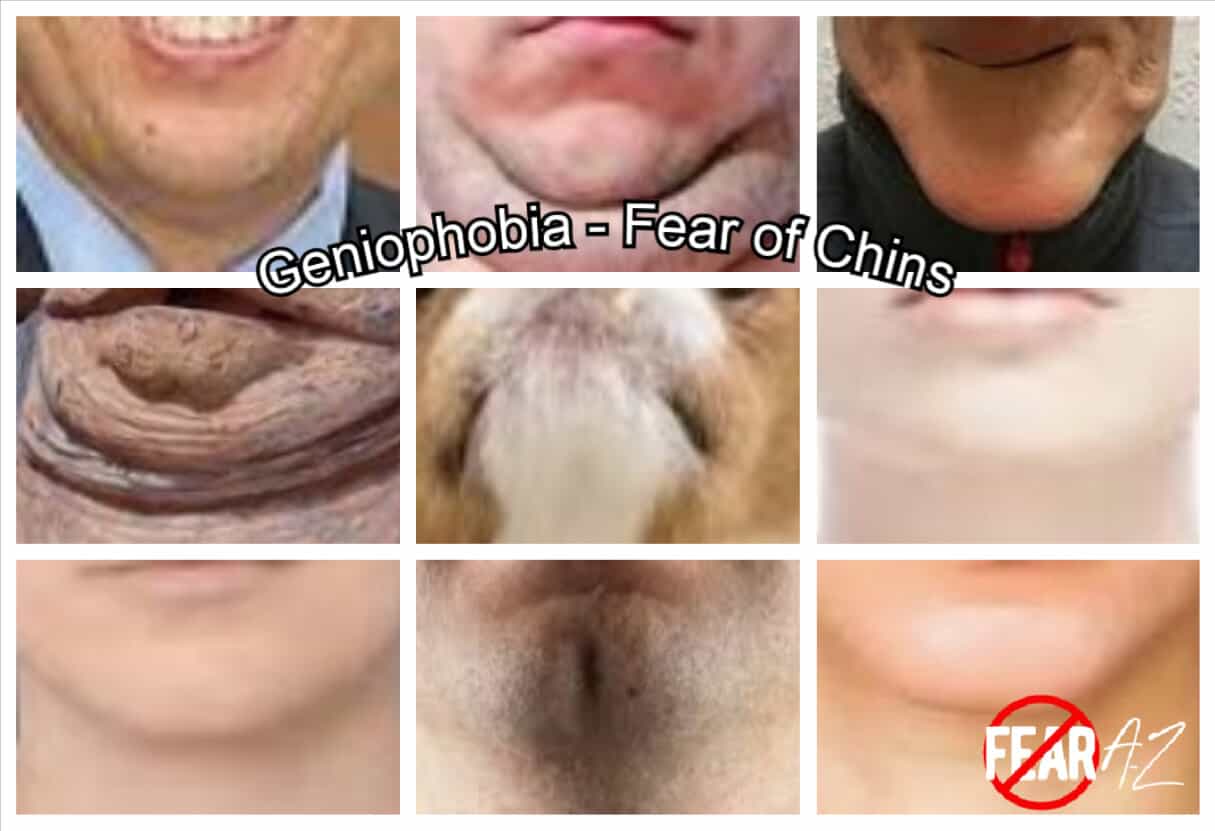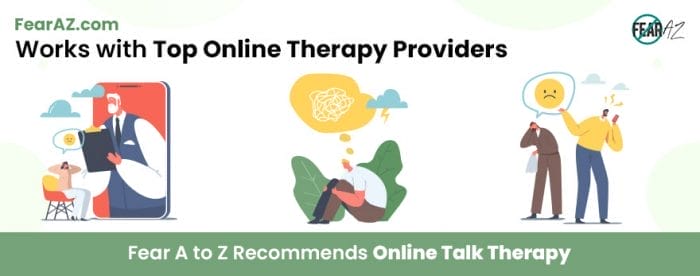Share This Article
Chins Plus Extreme Fear Equals Geniophobia
Do you feel uncomfortable talking to people because you’re afraid you’ll see their chins? You don’t want to be rude, so you try to look into people’s eyes while you’re talking with them. However, you can still glimpse a part of their chin, and you can’t help but feel anxious.
Does the mere thought of chins make your heart race and have you on the verge of panic? Even the thought of seeing your own chin in the mirror fills you with dread.
Yes, geniophobia, or fear of chins, is on the list of phobias, and it can be debilitating when it’s severe. But with professional treatment and self-help, you can overcome it and lead a normal life.

What Is the Fear of Chins?
Geniophobia comes from the Greek word genio, which means chin or jaw, and phobia, which means fear.
Prominent chins give people their identity. Part of what makes Jay Leno funny is that he is able to make fun of his chin and make money off the jokes, too. Part of what makes actors Henry Cavill and Jessica Chastain beautiful and memorable are their cleft chin.
But to some people, their butt chins are the devil! In fact, any chin fills them with dread.
You see…
People who have geniophobia will experience a rush of anxiety just thinking of chins. Some may have goosebumps when they touch their own chin.
The reaction may be strange, but that’s how phobia works. About 5% to 10% of the world population have a specific phobia, which is the fear of something that poses little to no danger, like the innocent chin.
Geniophobia is rare. Unfortunately, if you have it, you may have difficulty dealing with people with remarkable or weird chins. Sometimes, you might isolate yourself just because you don’t want to see chins—any type of chin!
Now. . .
You may seem standoffish or rude, but it’s not intentional. Phobia is an anxiety disorder. And just like other anxiety disorders, there are ways to cope with your phobia. The first step is understanding its causes.
What Causes Geniophobia?
Most phobias develop because of negative or traumatic experiences. However, with geniophobia, it’s hard to ascertain because chins are not characteristically scary, unlike obvious phobias like fear of spiders (arachnophobia) or snakes (ophidiophobia).
Experts say upbringing has a lot to do with it. Parents with geniophobia may unwittingly raise their children to have a similar fear because they could not overcome it themselves.
Genetics also plays a role in geniophobia. Someone with a family history of anxiety disorder has a higher chance of developing geniophobia.
Related Phobia – Fear of Hair
How Genes Play a Role in Geniophobia
Have you ever wondered how you got geniophobia when none of your other family members have it? There are no geniophobia genes to be passed around from one generation to the next. However, genetic susceptibility to mental illness, particularly anxiety disorder, is something that can be passed.
A phobia is a form of anxiety disorder. If someone in the family has a history of anxiety, people who share the same genes may develop different types of anxiety disorders.
The phobia may develop at a certain point even though it may not run in the family. For example, one may have had an experience falling and busting their chin open, resulting in a misshapen chin. From then on, they may have a hard time looking at strange chins, or worse, chins in general.
Another situation may involve an unexpected scare with a unique chin.
While it’s hard to pinpoint a specific root cause for geniophobia, mental health experts agree it’s a combination of genetics and environment.
Symptoms of Geniophobia
There is a fine line between disgust and fear. Geniophobia does not stem from disgust; it is an intense, irrational fear.
Psychological symptoms of geniophobia may include:
- Anxiety at the thought of chins
- Fear of passing out
- A sense of dread
- Fear of losing control
Here are some physical symptoms of geniophobia:
- Increased heart rate
- Increased breathing rate
- High blood pressure
- Sweating
- Muscle tension
- Tremors
- Panic attack (in case of severe geniophobia)
Symptoms vary from person to person, depending on the severity of the phobia.
But there’s a way out of it!
How to Deal with Geniophobia
There is no definitive root cause for geniophobia, so there is no specific medical or psychological way of treating the fear of chins.
Nevertheless, there are several ways to cope with geniophobia:
Self-Help: What You Can Do to Cope
Most of the professional help available for geniophobia involves changing the way you think about chins. You can try to manage it yourself using the following methods:
- Yoga
Yoga can help you regulate your stress response, which is essentially what a phobia is—a stressor that gives you anxiety. Coupled with meditation, yoga will provide you with the necessary psychological mechanisms to cope with your fear of chins. One of the techniques of yoga is breathing deeply and slowly. You can visualize chins while you breathe in deeply and slowly release the visual when you exhale. - Talk to Someone
It is understandable that geniophobia is not something easy to talk about with other people. After all, it’s not a common phobia. However, a true friend will listen, try to understand, and won’t judge you. Talking to someone will lighten your load. That someone may also help you manage your reaction whenever you see a weird chin. - Join a Support Group
It’s comforting to meet people, whether in real life or online, who are in similar situations as you. You may not necessarily find another person with geniophobia, but there’s a sense of relief knowing you’re not the only one having anxiety problems over what most people would think as inane. Some may even share techniques to help you manage your fear.
Geniophobia Treatments: Professional Help
Exposure Therapy
Exposure therapy is one of the most common psychological treatments for phobias. The goal is to change your response to the thing you fear the most: chins. The therapist will repeatedly expose you to different types of chins, help you manage your emotions and reactions, and hopefully alleviate your anxiety.
The exposure is gradual. The first step may involve thinking about chins in different situations. The next step would be looking at photos of chins, which may progress into looking at videos.
And when you’re ready, you’ll be able to look at people’s faces, especially those with prominent chins.
Cognitive Behavioral Therapy (CBT)
CBT is a psychological treatment used for various problems, including anxiety disorders, depression, substance abuse disorders, eating disorders, and even eating disorders. The core principle of this type of treatment is that problems are partly based on how people think and a pattern of unhelpful behaviors.
CBT strategies in this case include reevaluating how a person thinks about chins and gaining a better understanding of their behavior toward them. The goal is for those with geniophobia to become more pragmatic about their thinking and approach when it comes to chins.
How to Avoid Fear of Chins
Avoiding chins is not the answer, as it will only cause heightened anxiety in the future. The best thing to do is to cope with geniophobia and manage your reaction to chins.
With self-help techniques, you can handle the fear. Breathing deeply through a rise in anxiety can help you relax. It will also help when you have a friend who can support you through the ordeal.
However, if your geniophobia is not getting better with self-help techniques, seek professional help.
Lastly, there is exercise. The simplest forms of exercise, like walking, jogging, and cycling, can do wonders for your anxiety. For one, exercising diverts your attention from what you fear. Two, plenty of research has shown that exercise is great for your mental health. With regular exercise, you may conquer your chin problem in no time.
Bottom Line
Keep your chin up. Geniophobia is nothing to be ashamed of. Just like people with unusual chins have nothing to be ashamed of, neither do you.
But to ensure that your fear of chins doesn’t graduate to a more severe disorder, do something about it. In most cases, you can cope through yoga, meditation, and therapy. Otherwise, professional help will go a long way.
Maybe once you’ve conquered your fear, you can head to TikTok for some funny chin videos.




